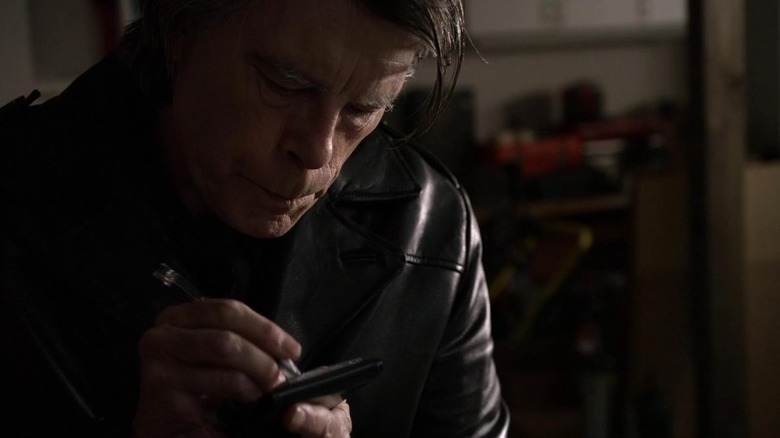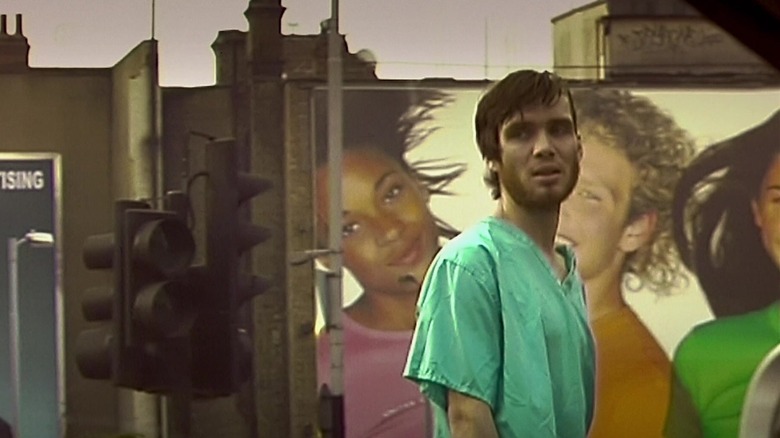The 2000s Horror Classic That Didn't Scare Stephen King
Danny Boyle's 2002 post-apocalyptic thriller "28 Days Later" (which was unavailable to watch for a spell) isn't technically a zombie movie. It follows the spread of a newly-concocted virus nicknamed simply the Rage Virus, which invades its victims' brains and transforms them into un-thinking, wrathful monsters. Also, their eyes turn all gross and bloodshot. The "zombies" in "28 Days Later" are really just people with their human qualities removed and their rage pumped up to a thousand. Unlike most movie zombies, however, the infected people run fast and growl loudly. It was "28 Days Later" that sparked the still-raging "slow zombies vs. fast zombies" debate among horror-philes.
Boyle shot "28 Days Later" on the cheap, using then-novel digital cameras to give the film a disturbing documentary feel. It's especially raw in its early scenes of Cillian Murphy's Jim wandering the empty streets of London. On a budget of $8 million, "28 Days Later" earned over $84.6 million at the global box office, sparking a new interest in zombie cinema. It also came in the wake of 9/11, and audiences were feeling particularly apocalyptic at the time. Boyle's film tapped into some very real cultural fears.
Critics responded positively to "28 Days Later" — it has an 87% approval rating on Rotten Tomatoes — but cineastes almost instantly canonized it, holding it in high esteem as one of the best horror films of a new decade. It was followed by the sequel "28 Weeks Later" in 2007, with Boyle's "28 Years Later" (watch the trailer) currently due to reach theaters on June 20, 2025.
One person who didn't care for "28 Days Later," however, was Stephen King. Back in 2007, the famed horror author admitted to Entertainment Weekly that, out of the many horror movies he'd recently seen, "28 Days Later" simply didn't scare him. He liked the movie's style and storytelling, but he just wasn't frightened.
Stephen King likes 28 Days Later, but he wasn't scared by it
King, of course, wasn't just trying to be macho. There are plenty of young people who make a sport out of watching horror movies specifically to defy their abilities to frighten. King, a horror author who loves being scared, wasn't trying to prove his constitution; he was offering a legitimate criticism. He just wasn't scared. Impressed, yes. But not scared. When it came to horror films released in the late '90s or early '00s, King preferred a different, low-budget, naturally-styled, viral surprise horror hit. In his own words:
"[I] liked '28 Days Later,' but didn't love it. The bottom line for horror movies doesn't change from year to year; their job is to scare you silly, and either they do it or they don't. '28 Days Later' intrigued me — I'm a sucker for survivors in empty cities, as anyone who's read 'The Stand' knows — but there was nothing in '28 Days Later' (as there was in 'The Blair Witch Project') that came back to haunt me later that evening, after the bedroom light was out."
Which is fair. The zombies in "28 Days Later" are threatening, but they're also nothing new for fans of "Night of the Living Dead" and movies of a similar ilk. "The Stand," incidentally, was the apocalyptic novel King first wrote in 1978 and then expanded greatly in 1990. That book also involves a worldwide epidemic that wipes out the bulk of the human population and features characters who spend a lot of time wandering abandoned cities.
Meanwhile, "The Blair Witch Project" (which scared King so much he turned it off) is the 1999 found-footage horror hit about a trio of amateur documentarians becoming lost in the woods while researching stories of a witch that supposedly lives therein. The witch is never seen, but the film is replete with spooky noises, genuine fear, and a bleak, ambiguous ending. It's surely one to make a viewer go to bed with the lights on. For King, actually feeling fear is the ultimate litmus test for a horror film, and "The Blair Witch Project" succeeded on that front. "28 Days Later" simply didn't.

